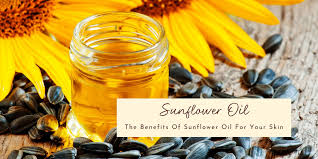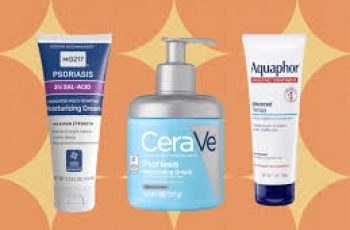
Sunflower Oil in Skin Care
Sunflower oil (Helianthus annuus) is an unsaturated fat derived from sunflower seeds. It is used in countless skin care products for its high concentration of linoleic fatty acids and its anti-inflammatory properties.
Sunflower oil is safe for most skin types and serves a variety of functions depending on the order of your skin care regimen.
It is one of the most popular oils used in skin and hair care products.
Is sunflower oil used in skin care?
Yes, sunflower oil is used in skin care in a variety of products like moisturizers, sunscreens, or massage oils, and face creams.
It has anti-inflammatory properties, and is used to treat many kinds of inflammation.
It can be used in practically all types of oil-based skin care products.
To find out if products containing sunflower oil are right for you, be sure to shop by your Baumann Skin Type.
Take the Quiz
Is Sunflower oil good for the skin?
Yes, sunflower oil is considered good for skin for many reasons including its high concentration of linoleic fatty acids which are known to be anti-inflammatory.
Sunflower oil is great as an ingredient in moisturizers, and is commonly used to hydrate skin.
In many cases, sunflower oil is used as an occlusive ingredient in treatments like skin slugging to increase absorption of other skin care products layered in your regimen.
Benefits of sunflower oil?
Sunflower oil has oleic, linoleic, palmitic, and stearic fatty acids- each of which has effects on the skin.
Sunflower oil is used in a massive variety of product types from moisturizing creams to body oil sprays and eye saving serums.
Is sunflower oil a clean ingredient?
Yes, sunflower oil is considered a clean, often organic ingredient.
It’s an entirely natural ingredient, and sourced sustainably.
is sunflower safe
Is sunflower oil safe in skin care?
Yes, for most skin types it is considered a good ingredient in skin care.
The EWG score for sunflower oil is a “1,” the second best score possible after “verified.”
This means that sunflower oil is considered extremely safe for use and is sustainably sourced.
Very few people are allergic to sunflower oil, with reactions only being mild in those rare cases.
Sunflower oil is recommended for numerous dry skin condition treatments.
Does sunflower oil have side effects?
Oils containing high concentrations of oleic fatty acids, like sunflower or olive oil, are not always the best for people with dry skin.
Oleic acid makes microscopic perforations in the skin which allows water to evaporate off the skin and aids in absorption of other skin care ingredients, allergens and irritants.
This can be a good thing in resistant skin types who have trouble getting ingredients absorbed into their skin barriers, but may be bad for sensitive skin types.
To avoid skin inflammation or irritation, make sure you consult a dermatologist about whether sunflower oil products should be used on your skin.
sunflower for sensitive skin
Is sunflower oil good for sensitive skin types?
Sunflower oil can be good for certain sensitive skin subtypes because it has high amounts of linoleic acid and is non-comedogenic, meaning it does not clog pores.
Using sunflower oil does not cause acne if used properly in your skin care regimen.
However, sunflower oil is a dry oil, which means it leaves a film behind as it oxidizes.
Here are some products designed for sensitive skin types.
If you’re concerned about clogged pores, be vigilant about washing the film off based on your dermatologist’s advice.
What kind of oil is sunflower oil?
Sunflower oil is made from predominantly unsaturated fatty acids. meaning it is a “dry oil”.
Some people might also categorize it as an essential oil, as it is pressed sunflower seed extract.
It can be considered both an essential oil and an unsaturated oil.
Sunflower oil compared to other oils?
Compared to other oils, sunflower oil is considered affordable, effective, versatile, and common.
As an unsaturated fat, sunflower oil is less occlusive and hydrating than oils that have saturated fatty acids in them.
It does not form as thick a barrier on skin as some other oils.
What is vitamin e?
What Vitamins are in sunflower oil?
Sunflower oil has these vitamins:
Vitamin A
Vitamin C
Vitamin D
Vitamin E
Vitamin K
Not many oils are as nutritionally diverse as sunflower oil.
Overall, sunflower is a gentle yet effective oil usable for most skin types and conditions as well as being natural and cheap to buy.
sunflower for hair
Is sunflower oil used for hair care?
Your hair is made of proteins which can be dehydrated and damaged much like your skin can.
Some products are specially designed to repair and rehydrate damaged hair.
Oils like sunflower oil are great for use in hair care or hair repair.
Hair absorbs oil extremely well, meaning they can take in lipids easily.
Be careful not to use too much oil in your hair, as it will all be absorbed, shaping your hair into heavy locks.
Overuse of oils in hair will lead to greasy texture and wet appearance.
Is sunflower oil right for me?
Sunflower oils might be good for your skin if you:
Have dry skin
Want an oil that feels less greasy than saturated oils
Are looking for affordable skin care products
Care abut the environment and sustainability
Are pregnant
It is safe for use in hair care, skin care, and baby care; it very well might be right for you too.
To find out if sunflower oil is right for your skin, take the quiz below, and shop by your Baumann Skin Type.
Take the Quiz
Which fatty acids are in sunflower oil?
Active fatty acids play a huge role in determining the effect of an oil or fat in skin care.
Different oils have different combinations of fatty acids, with not all fatty acids present in all oils.
Sunflower oil’s fatty acids are primarily oleic, linoleic, palmitic, and stearic fatty acids.
To see how sunflower oil compares to other oils in terms of fatty acid content, check out this table below.
fatty acids table
Differences between argan oil and sunflower oil?
Argan oil and sunflower oil come from two different plants.
Sunflower oil comes from sunflower seeds.
Argan oil is collected from the kernels of the argan tree.
They are both unsaturated fats and plant extracts.
Argan oil has a lower concentration of linoleic fatty acids than sunflower oil, but higher concentrations of oleic fatty acids.
While argan oil is mainly used for moisturizing, sunflower oil is mainly used for skin barrier protection/repair.
Is sunflower oil the same as safflower oil?
Sunflowers and safflowers sound deceptively similar, however they are two different flowers.
Safflower’s INCI name is Carthamus tinctorius.
Both plants’ seeds are used for their extracts in skin care, and both contain unsaturated fats.
Because of their similarities of names and function, some people might think they’re the same product.
They are extremely similar, but not exactly. The two oils are often interchanged freely for those reasons.
Their fatty acid concentrations vary slightly, see the table above to compare specifics.
Another flower extract used in skin care is evening primrose oil, click here to learn about this fascinating flower in skin care!
sunflower with retinoids
Can you use Sunflower Oil with Retinoids?
Sunflower oil would be effective at helping retinoids absorb into skin because of linoleic acid.
The small perforations linoleic acid can cause would open pathways for retinoids.
Conversely, sensitive skin types might want to avoid using this combination, because increased absorption of retinol will increase side effects.
Using a retinoid with sunflower seed oil elsewhere in the regimen will affect how well your skin care routine works.
Let us guide you on choosing the best skin care products and skin care routine for your skin type.
Take the Quiz
Is sunflower oil safe to use while pregnant?
Sunflower oil is absolutely safe to use during pregnancy.
In fact, sunflower oil has even been observed to assist with the condition of subclinical breast inflammation because of its effect on milk cytokines.
This condition changes the nutritional content of breastmilk, which can inhibit growth in infants.
Sunflower oil supplement intake correlated to improvement in the nutritional value of breastmilk and the babies’ outcomes.
There is no research that suggests using sunflower oil either orally or topically negatively impacts pregnancy.
Sunflower oil can be combined with skin lighteners if you are experiencing melasma during pregnancy.
Is sunflower oil safe for babies?
Sunflower oil is considered very gentle on skin. It is safe for use in babies.
It is a slightly occlusive oil that can protect a baby’s skin from diaper rash, eczema and other skin irritations.
One study in Bangladesh found that use of sunflower oil in newborns decreased contraction of a particular bacterial infection by 41% in a study of hundreds of babies. (23)
Make sure to consult a pediatrician on how best to use sunflower oil for your baby.
best sunflower products
Which are the best sunflower oil products in skin care?
Check out this collection of sunflower oil products!


